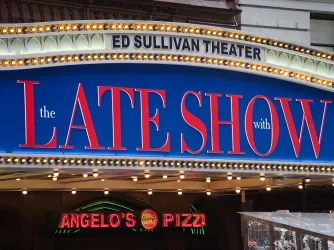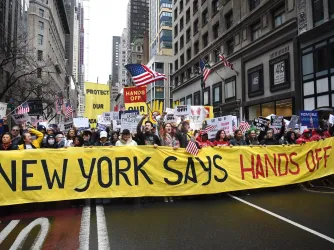Table of Contents
More on Twitter’s recent suspension of journalist accounts

Shutterstock.com
FIRE has received feedback about our statement Friday criticizing Twitter and Elon Musk’s suspension of journalists whom he accused of doxxing him and his family. Since we released our statement, Twitter reinstated most of those accounts, but also suspended more journalists for reasons that are unclear.
We will get to all of that, but first we want to address the concern that FIRE is politically biased for not speaking out about other instances of censorship on Twitter, such as the information revealed in the “Twitter Files.” That’s simply not true.
Here are just a few recent examples of our criticism of big tech censorship and government attempts to regulate speech on social media:
- Four days ago, FIRE Senior Fellow and former longtime Executive Director Robert Shibley wrote that Musk’s release of the Twitter Files “has done a public service by opening up the company’s vast censorship regime to public scrutiny.” We continue to monitor the release of the Twitter Files, and are very troubled by the latest revelations that the FBI not only flagged allegedly false election-related posts on Twitter — some of which were clearly jokes or satire — but also sought users’ information from Twitter to “aid the FBI in assigning any follow-up deemed necessary to the appropriate FBI field office.”

One Weird Trick for Fixing Elections
A public-private partnership formed by elite institutions and the federal government quietly eats away at the First Amendment.
- Last month, we wrote about the Department of Homeland Security’s creation of a public-private partnership, called the Election Integrity Partnership, to suppress purported election-related misinformation with the help of big tech. “In their zeal to play gatekeeper,” we said, “a group of elite institutions, partnering with government agencies, is picking and choosing what Americans see online. Whatever you want to call that, it isn’t democracy.”
- Last Tuesday, we called out government officials for pressuring social media platforms to censor “hate speech” and “misinformation.”
- Two weeks ago, we sued New York to challenge its unconstitutional law requiring social media networks to address speech that could “vilify” or “humiliate” people based on protected class (like race, gender, or religion).
- Month after month, we’ve criticized other instances of Big Tech censorship, arguing “PayPal is no pal to free expression” when it shuttered accounts for viewpoint-discriminatory reasons and when it threatened financial penalties for spreading “misinformation.” We said you better watch what you say when Apple’s app store acts like a censorial Big Brother.
FIRE is proudly nonpartisan and deeply dedicated to defending free speech as both a constitutional right and cultural value. A quick review of our archives or social media feeds will dispel any claim of partisanship. What’s more, the only reason FIRE hasn’t commented on all of the social media free speech issues before this year (of which there were many) is that we formerly focused exclusively on campus free speech and due process issues. Our mission only expanded to encompass off-campus free speech issues in June.
As for Twitter, we genuinely hoped Musk would succeed in promoting a culture of free expression. And we’d still like to see it happen. In April, FIRE President and CEO Greg Lukianoff wrote Musk an open letter encouraging “much-needed changes to the platform that will make it a positive force for free expression, interpersonal connection, and broader community understanding.”
We’re happy to give credit where it’s due when Musk makes decisions that bolster free expression, such as restoring accounts like The Babylon Bee and Jordan Peterson that were banned under previous leadership.

Open letter to Elon Musk from Greg Lukianoff on preserving free expression on social media
FIRE President and CEO Greg Lukianoff advises Elon Musk to look to First Amendment law for guidance on implementing free speech-friendly policies.
But we have to call it like we see it. And what we saw this past week did not look like the actions of a self-described “free speech absolutist” who hoped even his worst critics remained on Twitter “because that is what free speech means.”
People are talking past each other in this latest controversy, operating with different versions of the facts or different definitions of “doxxing.” In Friday’s statement, we objected to the “apparent suspension of journalists for reporting about a story of public interest” — that is, the story of Twitter banning the @ElonJet account — and the sudden addition of overbroad and vague language to Twitter’s private information sharing policy to justify those suspensions without notice. This style of rash, arbitrary, ad hoc decision-making is itself a threat to free speech, as it undermines confidence that Twitter will apply its rules fairly and consistently.
Musk has since lifted most of the suspensions based on the results of a Twitter poll. While we’re happy he did so, free speech commitments should not hinge on a popular vote. Free speech is an anti-majoritarian principle whose very purpose is to protect minority or dissenting views from persecution by the majority.
Reports indicate that the suspended journalists reported on the ban of @ElonJet, or linked to a version of the account that exists on another social media platform. Neither Musk nor Twitter provided any evidence the suspended accounts did anything more to earn a suspension. Musk presumably would be eager to share that information if it existed, and we would be happy to consider it. But these reporters’ known actions are a far cry from publishing private information about a person with the intent of causing them harm — the commonly understood definition of doxxing.
For one thing, the @ElonJet account apparently used publicly available information to chart the movements of Musk’s jet — not necessarily the location of Musk himself or, if he was on the plane, his final destination after landing. Musk himself said in November that his “commitment to free speech extends even to not banning the account following my plane,” despite considering it a “direct personal safety risk.”
The problem with Twitter’s flawed policy, like any speech code, is that it grants the decision-maker vast discretion to make arbitrary and subjective calls about what’s permissible and what’s not.
But even if you believe Twitter’s suspension of the @ElonJet account is reasonable, that doesn’t justify its suspension of journalists who simply reported on or linked to the account. By the time they did so, the existence of the @ElonJet accounts was already extremely public information. In fact, Musk’s banning of the account almost certainly produced a Streisand effect, calling more attention to the same flight tracker on other websites, something Musk seemed to acknowledge.
And while the @ElonJet episode is over, Twitter’s suspension of journalists continues, for reasons unknown. On Friday, Twitter suspended journalist Linette Lopez, who has done investigative reporting on Tesla, another company Musk controls. Yesterday, Twitter suspended Taylor Lorenz, whose last tweet reportedly was a generic request to Musk for comment on a story she is writing about him. The suspension also came after digital marketer Ariadna Jacob repeated accusations that Lorenz doxxed her address in a 2020 New York Times article, to which Musk replied, “Such shameful behavior will not be tolerated going forward.” Again, Twitter provided no specific reason for either suspension, underscoring the platform’s problems with due process and transparency. As a result, it’s hard not to conclude that Musk is simply targeting his critics.

The ‘Twitter Files’ have opened the company's censorship decisions to public scrutiny
Elon Musk's publishing of prior management's internal decision-making processes around the 2020 election reveals how content moderation decisions were made.
We are aware of the alleged incident in which someone followed and climbed onto the hood of a car carrying Musk’s son in Los Angeles. The Los Angeles Police Department said no crime report has yet been filed, and we haven’t seen any evidence connecting this incident with the @ElonJet account — let alone the journalists talking about it after its suspension. Obviously, if someone stalked or attacked Musk’s son, that is reprehensible and the stalker should be arrested.
To be clear, FIRE does not oppose a social media company maintaining a reasonable anti-doxxing policy that serves the twin goals of fostering a culture of free expression and protecting people from criminal activity like stalking or true threats. We are happy to have a conversation about what that policy should look like. What we can say for sure is it should not cover journalists or anyone else commenting on information that is widely known to the public.
We’ve said before that social media companies should look to the First Amendment as a guide in crafting content moderation policies, while recognizing they have no obligation to do so. The First Amendment makes no general exception for sharing others’ private information — let alone publicly available personal information — but it does make exceptions for true threats of violence and speech intended to, and likely to, incite imminent unlawful action. These are good starting points for an anti-doxxing policy, though we recognize they may not cover every instance of the publication of private information that a platform might reasonably want to ban.
What we don’t want to see is an insidious expansion of “doxxing” to cover all sorts of speech that does not actually present an imminent threat of real, physical harm. Nor do we want Twitter to rely on a policy with vague standards that are ripe for abuse. The company’s revised “Private information and media policy” fails on both counts. For instance, users may not “share private media, such as images or videos of private individuals, without their consent” — but Twitter “may” allow users to do so if it’s “part of a newsworthy event or to further public discourse on issues or events of public interest.” In other words, Twitter will allow newsworthy private media to stay on the platform — if it feels like it.
Would this video tweeted last Sunday, of a large group of migrants who just crossed the border into El Paso, violate the policy? Some might argue it presents a security risk for the migrants, but it was surely newsworthy. So, the rules say Twitter might allow it. Of course it should stay up — but the problem with Twitter’s flawed policy, like any speech code, is that it grants the decision-maker vast discretion to make arbitrary and subjective calls about what’s permissible and what’s not.
Social media companies should look to the First Amendment as a guide in crafting content moderation policies.
The policy also bans tweets that share someone’s live location regardless of intent and regardless of whether the information is publicly available — but Twitter “may” make an exception if the location is “shared during a crisis situation to assist with humanitarian efforts or in relation to public engagement events.” Yet, another part of the policy appears to ban sharing live location information with no exceptions. Even if Twitter consistently applied these exceptions, the policy would be overbroad. Does anyone think, for example, that someone excitedly tweeting “I just met Bruce Springsteen at the Philly airport!” is doxxing him?
As we said on Friday, Musk owns Twitter and can do whatever he wants with it. But he has repeatedly said free speech is essential for the future of civilization. That’s why he bought Twitter in the first place.
To that end, we still hope he will make it a valuable domain for open debate, discussion, artistic expression, comedy, understanding, and human connection. For that to happen, content moderation needs to proceed according to a clear set of fair, narrow, and consistently enforced speech-protective rules — not one person’s personal whims and biases.
Recent Articles
Get the latest free speech news and analysis from FIRE.

He refused to censor his syllabus — so Texas Tech cancelled his class

Fandom’s lighthouse in a sea of censorship

FIRE statement on Stephen Colbert’s James Talarico interview and continued FCC pressure


